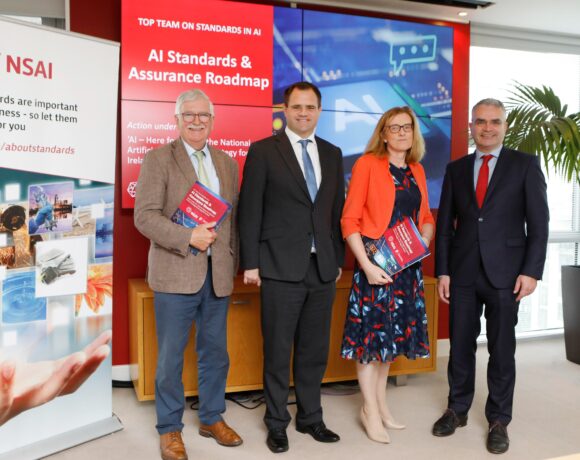Budget increases by €360 million to €11.1 billion as special education, small schools and teaching principals benefit from new investment.
More higher education places and new third level courses being created as part of new €60 million fund.
Increase in funding for apprenticeships and training under the National Training Fund.
Budget 2020 provides the fourth successive year of major reinvestment in our education and training system.
Minister for Education and Skills Joe McHugh T.D. said: “Amidst the unknowns of Brexit and the constraints this has imposed on Budget 2020, we must ensure we remain dedicated to doing our best for the most vulnerable and continue to invest in education for future generations.”
Building on the initiatives set out in the Government’s Action Plan for Education, the budget for the Department of Education and Skills will be a record €11.1 billion in 2020, an increase of 3.4% on 2019.
This demonstrates our commitment to continue to create an inclusive and empowering education system. Our focus is on enhancing the educational opportunities of all young people and adults.
Budget 2020 continues this Government’s significant investment in recent years for children with additional needs. It builds on the drive to reduce class sizes. It gives more flexibility to principals who teach. It provides new funding for higher education. It sustains small schools – the lifeblood of communities. It guarantees new and improved school buildings and facilities in colleges and universities.
Investment in education and young people is a cornerstone of this Government’s policy.
Over the four budgets from 2016, the total funding package for the Department of Education and Skills has risen by almost €2 billion.
Some of the key features of Budget 2020 in education and skills:
New Teachers
- We will recruit 581 new teachers – 408 of whom will be working with children with special needs.
- 153 of the new teachers will be working in mainstream roles and another 20 will be recruited to work in small schools.
- Our education system will have 71,473 teachers, with the teacher allocation ratio in primary schools at its lowest-ever level.
Special Education
- €1.9 billion will be invested in special education – one-fifth of the record education budget.
- Some 1,064 additional special needs assistants will be hired to work with children with special educational needs in schools. There will be almost 17,000 SNAs in our schools.
- 265 new teachers will be recruited to work in special classes in our schools.
- An additional 120 special education teachers will be recruited for mainstream schools; while another 23 teachers will be hired for special schools.
- Our investments will ensure more than 1,300 new places in special classes.
- The State’s enhanced capitation grant for running costs will increase by 7.5%.
Support for Small Schools
- Improved teacher staffing levels will be introduced for small schools with four teachers or fewer.
- The one-point reduction in the staffing schedule will help ensure better teacher retention in schools with up to four teachers.
- The improved schedule will apply in two, three and four teacher schools and ensure one less pupil is required to retain/recruit a teacher.
More Third Level Opportunities
- A fund worth €60 million for higher education institutions that seek to create new and diverse courses to expand the number of student places while preparing young people for a fast-changing world of work.
- The investment is part of the five-year €300m Human Capital Initiative, established from within the National Training Fund’s surplus.
- It will add capacity across higher education to meet priority skills needs for enterprise, to drive regional jobs growth and development and support key economic sectors in responding to the challenges of Brexit.
Leadership Opportunities
- One additional release day will be provided for primary school teaching principals.
- The extra time to carry out administrative duties will apply to 1,760 schools with fewer than seven teachers.
New and Improved School, College and University Buildings
- Budget 2020 investment includes a capital allocation for new, bigger and more energy-efficient school buildings and third level facilities with a €922 million budget for 2020 under Project Ireland 2040.
- This investment will deliver in excess of 30,000 school places.
- Since 2016 we have invested €3billion in these building projects.
Improved School Funding
- All schools will see a 2.5% increase in the State’s capitation grant per child from September 2020.
- Building on the renewed investment in recent years, the increase will see an additional €4.8m grant for schools in a full year.
- A €1m investment to provide funding for school books in primary schools.
Gaeltacht Grants
- Restoration of the Gaeltacht grant for students on State-funded Initial Teacher Education programmes.
School Transport
- An additional €26 million will be invested in the school transport system to provide for growing numbers of school children.
Public service pay
- €143m investment to implement the Public Services Pay and Stability Agreement.
Investing in Research
- €3.3m investment in universities to identify and drive research areas of growth, enhance international collaboration, raise the third level profile and engagement with international and industry research funders.
Apprenticeships and Skills
- A major funding package is being made available from the National Training Fund to significantly increase workplace and employer-led training, boost apprenticeship numbers and help to address Brexit-related issues.
- An additional €27 million is being made available for apprenticeships. It will support 7,000 apprenticeship registrations in 2020, and a range of new schemes.
- The investment puts the Government on course to meet the commitment to double the number of apprentices in training in the period 2016-2020.
- By the end of 2020 more than 20,000 apprentices will be training.
- We are also backing upskilling with almost €8 million additional funding for Skillnet Ireland and an additional €6 million for employee skills development initiatives.
Minister McHugh said: “We have a record budget for education and skills of more than €11.1 billion. We are putting one fifth of that into special education. The Department of Education and Skills is one of the biggest investors in people. I am determined to continue to promote our inclusion strategy and the importance of special education and how it enriches our school communities.
“Our budget is investing in a way that recognises the importance of communities, by sustaining small schools, by finding new ways to invest for our children and by ensuring we empower our young people for the future.”
Minister Mitchell O’Connor said: “Since Higher Education is pivotal to underpin Ireland’s future economic success and social development, I am delighted today to announce an additional €150m package including a further €74 million from NTF investment. Higher education needs to be in a prime position to respond to the impacts of Brexit and meet our digital skills needs by enabling institutions to focus on upskilling, reskilling and lifelong learning.
“A further €60 million investment under the Human Capital Initiative combined with €18 million addressing demographic pressures will provide an estimated 5,700 additional student places and help future proof our graduates. 2020 will also see the launch of a major multi-annual transformation fund of €90 million for Technological Universities, a €3 million fund to promote excellence in research and a new €2 million annual commitment to provide support for student mental health and wellbeing.”
Minister Halligan said: “It is of critical importance that Ireland maintains its traditional high standards when it comes to developing a skilled, internationally competitive workforce, particularly as we wait to see the economic impact of Britain’s exit from the EU. To that end I welcome this Government’s budgetary commitment to supporting 7,500 apprenticeship registrations, diversifying the range of schemes available and putting Ireland on course to have 20,000 people in apprenticeship training by the end of 2020.
“The need for our workforce to upskill and retrain in order to meet the challenges of an evolving economy has also been recognised with €8 million in additional funding for Skillnet Ireland and €6 million for employee skills development initiatives. It is also vital that our universities and third level institutions continue to act as drivers of research and innovation in the post-Brexit landscape, so that we can build strong and progressive academic links with our international partners. I am glad to see €3.3 million being made available to our universities so that they continue to drive growth in the area of research and development and to develop academic collaboration internationally.”













